The itch and pain of inflamed and irritated skin can drive you into terrible discomfort. There seems to be no way to get rid of it. You know of conventional medical therapies, but also know they come with side effects you don’t want. Natural eczema therapies may be your best option.
The natural eczema therapies discussed below work not only on the symptoms you experience outwardly: the itch and irritation. They also begin to address the underlying causes of this condition: inflammation.
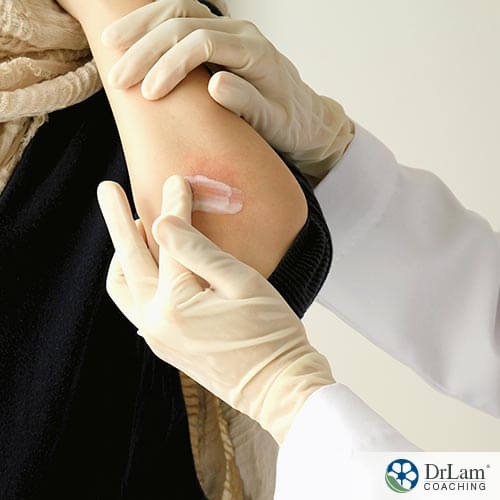 Eczema is a label for a group of conditions that lead to your skin becoming inflamed and irritated. It may also be called atopic dermatitis or atopic eczema. This most common type of eczema may stem from an inherited tendency toward other allergic conditions such as asthma or hay fever.
Eczema is a label for a group of conditions that lead to your skin becoming inflamed and irritated. It may also be called atopic dermatitis or atopic eczema. This most common type of eczema may stem from an inherited tendency toward other allergic conditions such as asthma or hay fever.
Anywhere from 10-20% of babies and 3-6% of adults suffer from eczema and can benefit from natural eczema therapies. The majority of children grow out of their symptoms by their tenth birthday. However, some people continue to suffer for the rest of their lives.
Control of symptoms continues to be the goal of therapy. There is no permanent solution to eczema. Natural eczema therapies appear to be the most effective with fewest side effects, however.
An itchy, red rash makes up the main symptom of eczema. No matter which part of the skin becomes affected, this remains the same with all types of eczema. If the itching begins first, the rash typically shows up on the face, behind the knees, on the wrists, hands, or feet. However, it may also affect other areas as well.
Most of the time, the areas affected become dry, thickened, or scaly. With fair skin, the affected areas usually start out red, then turn brown. If you have darker skin, the affected areas will show up as either lighter or darker than the rest of your skin.
In infants, the rash may become oozy and crusty. While patches of eczema can appear anywhere on babies, it most often occurs on the scalp or face.
Scientists and clinicians know of no specific causes for eczema at this time. But it appears a link exists with immune system responses to irritants. These responses lie at the root of eczema symptoms. Natural eczema therapies work to address these immune responses.
A number of triggers for eczema can set off flare-ups of symptoms. Some substances or conditions that may trigger symptoms include:
Another potential cause of eczema concerns a breakdown of the skin. Healthy skin holds moisture and forms a barrier against pathogens, irritants, and allergens. Eczema comes from a variation in genetics that detrimentally affects your skin’s ability to protect you. This causes a breakdown in your skin that leaves it vulnerable to irritants, allergens, and environmental factors.
Some differences of opinion exist concerning whether food allergies or sensitivities may cause eczema. Young children under age 3 or 4 who suffer from eczema typically also suffer from food allergies. The connection between eczema and food allergies ranges from 33% to 63%. About 10% of adults with eczema typically experience food allergies.
In infants and children, about 40% of those with moderate to severe eczema also have food allergies. However, it is difficult to identify which foods are involved or remove them from the diet, because the most common allergens are in so many foods. Diets that require food elimination can lead to nutritional deficits.
However, age tends to take care of much of this concern. Children often outgrow their food allergies, and the connection between food allergies and eczema does not appear as strong with adults.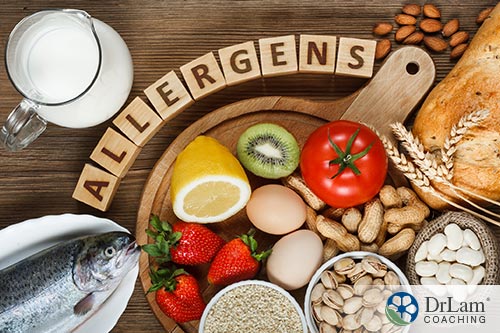
Rather than experiencing a food allergy, many adults with eczema suffer from food sensitivities. Instead of an allergy to foods mediated by IgE factors, these adults deal with delayed reactions to foods they eat. These food sensitivities can happen because people don’t digest certain foods easily. This leads to gas, bloating, diarrhea, or pain in the abdomen.
In contrast, food allergies trigger an immune response that affects many organs in the body and can become very severe. These kinds of allergic responses occur within minutes of ingesting the food and may lead to hives, vomiting, or swelling.
People who suffer from inflammatory conditions such as eczema may not exhibit such a clear boundary between allergies and sensitivities, however. When they eat certain foods, they may not show typical symptoms of allergies, but the foods do trigger an immune response that leads to eczema or some other inflammatory condition. Most of the time, the ingestion of these foods leads to a flare-up of eczema within a few hours or a day or so at the most.
In some cases, foods will bring on an allergic-type response but won’t show up with allergy testing. When a flare-up of this kind occurs, nearly any food eaten will make it worse. At times with babies, it appears the very acts of eating and digesting will bring on eczema. It seems some kind of neuronal circuit may cause the flare-up.
In a lot of these cases, once the inflammation decreases and their skin becomes clear, these people can eat any of the foods that seemed to trigger the flare-up. It appears that the threshold for triggering a flare-up becomes lower during a flare-up and a lot of foods may become triggers.
Theoretically, eczema may "landscape" the body for allergies by reducing the effectiveness of the skin barrier. The breakdown of the skin leads to a loss of moisture and allows irritants and allergens to access other tissue. This leads to an immune response and more inflammation. This causes hypersensitivity of the immune system to these allergens and irritants when they later enter the body another way.
Quite a few food sensitivities may become potential triggers for eczema flare-ups. Among them are:
The conventional therapies for eczema center around stopping the itch to prevent infections. Creams and lotions to moisturize the skin typically help some. Over the counter hydrocortisone cream or prescription creams to lower inflammation also help. Antihistamines, tar therapies, phototherapy, and cyclosporine may prove useful only temporarily.
Two immunomodulators can help mild to moderate eczema. These drugs carry FDA approval and inhibit the immune system to prevent flare-ups. They should be used only after all other therapies have failed because of increased cancer risk.
Oral corticosteroids to reduce inflammation also may be prescribed. While they prove effective, long-term use can produce significant side effects.
Topical steroids bring good results, but long-term use also leads to serious side effects. These side effects include: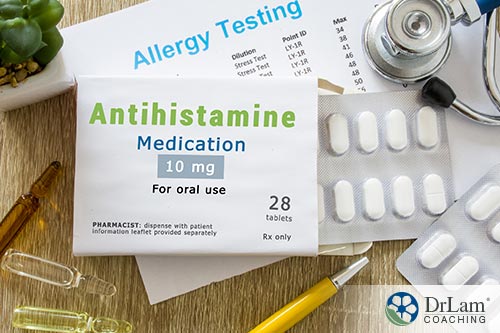
One of the more serious potential side effects of topical steroids involves adrenal suppression. This occurs when the steroid use continues over large body surface areas. It tends to inhibit your body’s production of cortisol, the stress-fighting hormone. High potency corticosteroids have brought on the greatest risk of this side effect.
Several natural eczema therapies show promise for dealing with the itch and inflammation behind eczema. You should, however, consult your primary healthcare professional before trying these therapies. He or she can help you decide which may work best for you and whether they will interact with other medications you take.
One of the best natural eczema therapies, aloe vera contains anti-bacterial, anti-microbial, and immune-boosting properties. It also works well to speed wound healing. Use a little bit of the gel on a patch of skin to check for sensitivities. Sometimes aloe vera causes a stinging sensation. To use it for larger areas, clean the affected area with unscented soap and water, then apply the gel to the area within three minutes.
Another of the natural eczema therapies, diluted apple cider vinegar may help. Research does not support its use for eczema, but some reason it may help because of its acidic nature.
Your skin naturally is acidic, but eczema can dry out your skin and change the acidity level. This may weaken the skin. The acidity in apple cider vinegar may help.
However, it is essential to dilute apple cider vinegar with water before using it. Its acidic nature may damage soft tissue, so dilute more it if it stings.
In addition, apple cider vinegar fights bacteria. It can help prevent infection in broken skin. Wet wraps or baths with apple cider vinegar can help soothe and heal.
This one of the natural eczema therapies contains anti-inflammatory and antioxidant properties. It helps control itching, dry skin, roughness, and scaling. Soak in a warm bath with powdered colloidal oatmeal added to it.
Naturally rich in beta-glucans, oats can aid in reducing skin inflammation and may stimulate the production of collagen. Research shows colloidal oatmeal forms a barrier on your skin to protect it while also adding nutrients to your skin. Other studies show using colloidal oatmeal as one of the natural eczema therapies soothes itching, helps normalize the pH of your skin, and soothes both dry skin and scaling.
Just draw a warm bath and dump the colloidal oatmeal powder in it. You should keep in mind that hot baths sometimes act as triggers for flare-ups of eczema, so make certain your bath is lukewarm.
If you’re allergic to oats or gluten, avoid using this product.
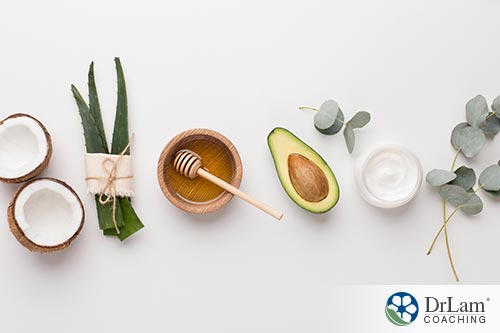 Another of the natural eczema therapies, coconut oil adds moisture to your skin and may fight inflammation and help damaged skin heal. The lauric acid contained in coconut oil also fights bacteria and protects your skin from infection. Research shows the antioxidant properties in coconut oil help relieve oxidative stress caused by eczema.
Another of the natural eczema therapies, coconut oil adds moisture to your skin and may fight inflammation and help damaged skin heal. The lauric acid contained in coconut oil also fights bacteria and protects your skin from infection. Research shows the antioxidant properties in coconut oil help relieve oxidative stress caused by eczema.
Research shows coconut oil works better than mineral oil in improving eczema symptoms in children.
Certainly, if you’re allergic to coconuts, do not use this product. However, if you suffer from allergies to walnuts or hazelnuts you may also suffer from coconut allergy.
To use coconut oil, put a small amount on your hands and rub it on the affected area. You can apply this during outbreaks of eczema or between outbreaks to keep your skin moisturized.
Used as one of the natural eczema therapies, honey contains antibacterial, antioxidant, and anti-inflammatory properties. It also helps boost your immune system and helps wounds heal faster.
If you choose to use honey for your eczema, you should only use medical-grade honey such as manuka honey. This type of honey contains no potential contaminants. Apply a thin layer on the affected area at night. Cover it with gauze and allow it to stay overnight. In the morning, remove the gauze and clean the area.
You may experience an allergic reaction to honey if you have this kind of reaction to bee stings or pollen. If symptoms of an allergic reaction appear, stop using honey. If the allergic symptoms become severe, seek emergency medical care.
Yet another of the natural eczema therapies, tea tree oil contains anti-inflammatory, antibacterial, antioxidant, and other properties that help wound healing and the causes of eczema. It must be used with a carrier oil and not put directly on your skin.
Clearly, inflammation lies at the root of eczema. Inflammation occurs both on your skin at the site of eczema and internally. The adrenal glands are responsible in part for regulating inflammation with the hormone cortisol. If your adrenals are weak, this can make inflammation more difficult to manage. Similarly, if eczema is not well controlled, inflammation can increase in the body, putting more stress on the adrenals.
As such, for those with eczema and adrenal fatigue, it is of vital importance to not only take care of the inflammation in the skin, but also internally.
The kind of inflammation that originates in the gut may come from a number of sources. One of those sources involves food sensitivities. As mentioned earlier, food sensitivities may lead to flare-ups of eczema.
This may provide an explanation for the mechanism behind those flare-ups. One of the natural eczema therapies that can help in this case is eliminating foods from your diet that you are sensitive to. However, you need to consult your healthcare professional and make sure you don’t eliminate so many foods that you experience malnutrition.
Sensitivity to foods may cause irritation and inflammation in your digestive tract. With enough of this irritation and inflammation, your gut may experience dysbiosis. This occurs when the microbes within your gut become unbalanced. More of the unhealthy bacteria overpopulate your gut and microbiome, resulting in small intestine bacterial overgrowth or SIBO.
These bacteria infiltrate throughout your GI system, causing more inflammation and irritation. This can lead to leaky gut in which the normally tight junctures between the cells lining your gut become loose. When this happens, pathogens, viruses, bacteria, and undigested food particles can access your bloodstream.
Once they do this, your immune system identifies them as invaders of your body and begins attacking them. Inflammation is the result. The inflammation can get so out of control that it becomes systemic. Thus your skin suffers from this onslaught of inflammation.
In addition, once your internal microbiota undergoes dysbiosis, the skin microbiota may also become affected. This tends to weaken the barrier your skin provides against pathogens and may trigger a flare-up of your eczema.
 Another result of dysbiosis of your gut, constipation stops the normal process of elimination of wastes. This results in a build-up of waste materials from your body. In time, these materials can begin decaying, leading to toxins building up inside your body. These toxins trigger your immune system to begin attacking them as harmful to your body.
Another result of dysbiosis of your gut, constipation stops the normal process of elimination of wastes. This results in a build-up of waste materials from your body. In time, these materials can begin decaying, leading to toxins building up inside your body. These toxins trigger your immune system to begin attacking them as harmful to your body.
These toxins can then influence other parts of your body, particularly your skin. They become a trigger for flare-ups of eczema because of the increase in inflammation brought on by the toxins your immune system attacks.
In addition, the build-up of toxins in your body becomes another source of stress feeding the demand on your adrenals to produce cortisol. This additional demand can further weaken your adrenals, increasing your feeling of fatigue, brain fog, and depression that come with Adrenal Fatigue Syndrome (AFS).
If your immune system must deal with a flood of what it perceives as foreign invaders of your body, it may get to the point of becoming hyperactive. When this happens, your immune system sends out its own flood of biochemicals to deal with these invaders. Unfortunately, this may lead to the immune system not identifying healthy cells correctly.
If it identifies healthy cells as invaders, the biochemicals released by the immune system begin attacking the healthy cells. This process leads to autoimmune disorders such as rheumatoid arthritis, among others.
The process also can lead to the development of eczema. The over-response of the immune system causes symptoms associated with eczema.
All in all, the inflammatory basis for eczema seems clear. While dealing with the inflammation may not fix your eczema, it will help alleviate the uncomfortable symptoms without bringing on any difficult-to-handle side effects. In this way, the natural eczema therapies will not add to the stress that makes AFS symptoms increase.
The immune system, the gut, and the microbiome are all key systems that are a part of the NeuroEndoMetabolic Stress Response. When one system like the gut or microbiome is affected, the immune system is closely affected also, and that's why it overreacts.
Eczema seems to be increasing in prevalence. Up to 10% of adults may experience this disorder. A larger number of infants show symptoms of the disorder but typically outgrow it by age 10.
While no permanent resolution for the disorder currently exists, control of the symptoms remains central to therapies. Conventional therapies include food exclusions to deal with possible food allergies or sensitivities. One potential difficulty with this approach concerns the possibility of these exclusions leading to malnutrition.
Over the counter or prescription creams and ointments may help reduce itching and pain. With the stronger of these medications - the topical steroids - significant side effects may require cessation of their use. These steroids can help control the inflammation that lies at the root of eczema.
If corticosteroids are prescribed and used over large areas of your skin, they can cause adrenal suppression. This condition limits the ability of your adrenals to produce cortisol to fight stress. This simply adds to symptoms of AFS and can increase them due to adding another source of stress to the body.
Antibiotics to combat infections caused by skin breakdown and scratching can also lead to GI tract problems. These kill both good and bad bacteria and can cause dysbiosis in your gut, with all of the difficult symptoms that brings. This dysbiosis may then bring on flare-ups of eczema.
Natural eczema therapies do not bring on the potential side effects of prescription medications. They typically work on the underlying inflammation and oxidative stress behind eczema. In addition, they strengthen your immune system and re-establish the protective barrier of the skin.
If you are suffering from eczema, here are a few things you can do to alleviate the situation. Try some of the following natural eczema therapies.
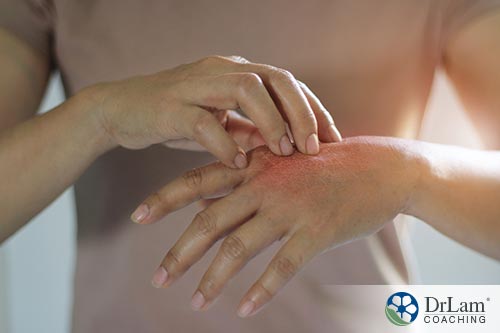
Whatever course of action you decide to take, however, please do so with the assistance of your healthcare provider, who will assess the benefits of natural eczema therapies for you as well as helping you apply them correctly.
If you would like to know more about or need help with eczema care, the team at Dr. Lam Coaching can help. We offer a free** no-obligation phone consultation at +1-626-571-1234 where we will privately discuss your symptoms and various options. You can also send us a question through our Ask The Doctor system by clicking here.
© Copyright 2021 Michael Lam, M.D. All Rights Reserved.
Natural eczema therapies target the underlying root cause of eczema: inflammation. While conventional therapies relieve itch and pain, the side effects can sometimes become significant. The natural eczema therapies have virtually no side effects. However, some of them should not be used on children under the age of 2.
